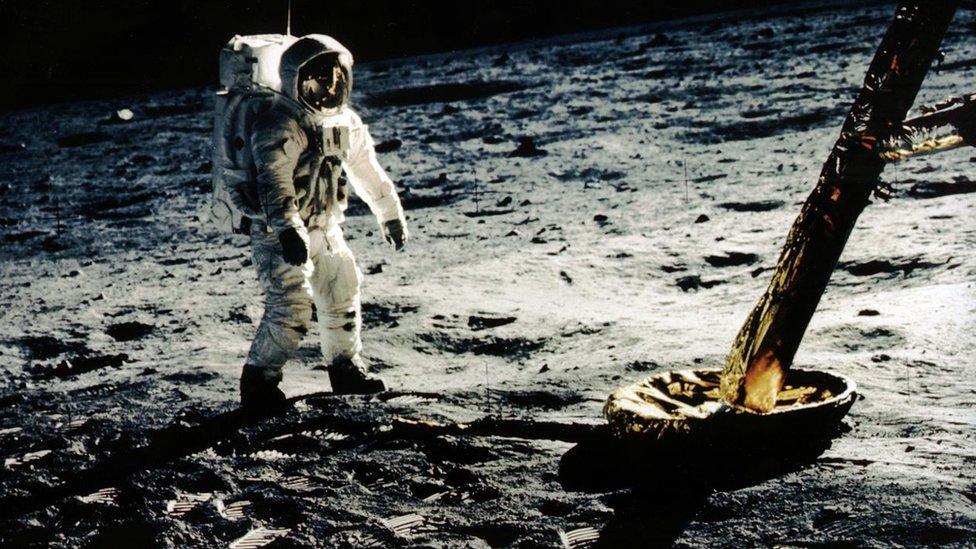Moon landing: The new spacecraft will be built in Alabama
- Published

Neil Armstrong was the first person to step foot on the Moon 50 years ago
Nasa has announced the new headquarters for its latest Moon landing mission.
The space agency has chosen the Marshall Space Flight Center in Huntsville, Alabama - a state in the south east of the United States - to lead its Artemis programme. A new spacecraft will be built to send astronauts - including the very first woman - back to the Moon.
Huntsville, which is also known as "Rocket City", has played a big part in Nasa's previous space missions.
Huntsville in Alabama is known as Rocket City
The announcement, made by Nasa's Jim Bridenstine, wasn't great news for Texas though. Lawmakers in the southern state wanted the Johnson Space Center in Houston to be picked as the site for Nasa's Moon mission.
However, Mr Bridenstine confirmed that Texas will still play a big part in the next Moon landing. Over 80 of the jobs linked to the mission will be based there.
When will Nasa be returning to the Moon?
It's been 50 years since the first Moon landing.
Apollo 17's mission in 1972 marked the last attempt and since that day 47 years ago, no human has been back. But that could all change in five years time if Nasa is able to pull of its latest plan.
A lot has changed since then and the new technology means Nasa has big plans for the next trip.
It doesn't just want to put a person on the Moon. Eventually, it wants to build a base there to help people explore even further into space.
Why does Nasa want to go back to the Moon?
An artist's impression of how the Gateway spaceship will look
Nasa says it wants to push the boundaries of human exploration forward to the Moon and then to Mars.
That means they want to have a permanent human base on the Moon within the next ten years to uncover new scientific discoveries.
It says returning to the Moon provides an opportunity for an eventual mission to Mars.
The mission to the Moon makes it possible to test equipment for building bases away from Earth, which could be very important for Mars exploration.
Nasa is hoping that returning to the Moon can move forward plans for putting humans on Mars
How will Nasa do this?
First, the agency wants to build a small spaceship that will orbit the Moon called the Gateway.
The spaceship will be a temporary home for astronauts who can live on board for up to three months at a time, conduct science experiments and take trips to the surface of the Moon.
Nasa says that one of the advantages of the Gateway spaceship is that it can move to different orbits around the Moon and conduct experiments in different locations.
The Gateway would be used as a science platform to look back at the Earth, observe the Sun and look at the universe, without anything getting in the way.
Why is it going to take another five years?
Building a spaceship to orbit around the Moon is no easy task.
The south pole of the Moon is where Nasa is planning on landing
The distance between the Earth and the Moon is vast - 30 Earth-sized planets could fit in between them!
Transporting the equipment needed and launching the Gateway spaceship needs very powerful rockets, which haven't been developed until recently.
Nasa says that the Space Launch System is going to be the most powerful rocket the agency has ever built
The mission was originally supposed to launch in 2028 but in 2017, US President Donald Trump challenged Nasa to land on the Moon by 2024.
Nasa is developing the Space Launch System (SLS) - a rocket, which they claim is the most powerful rocket the agency has ever built.
It is hoped the first piece of the spaceship will lift off in 2022.
- Published16 July 2019
- Published27 June 2019
- Published6 March 2019
